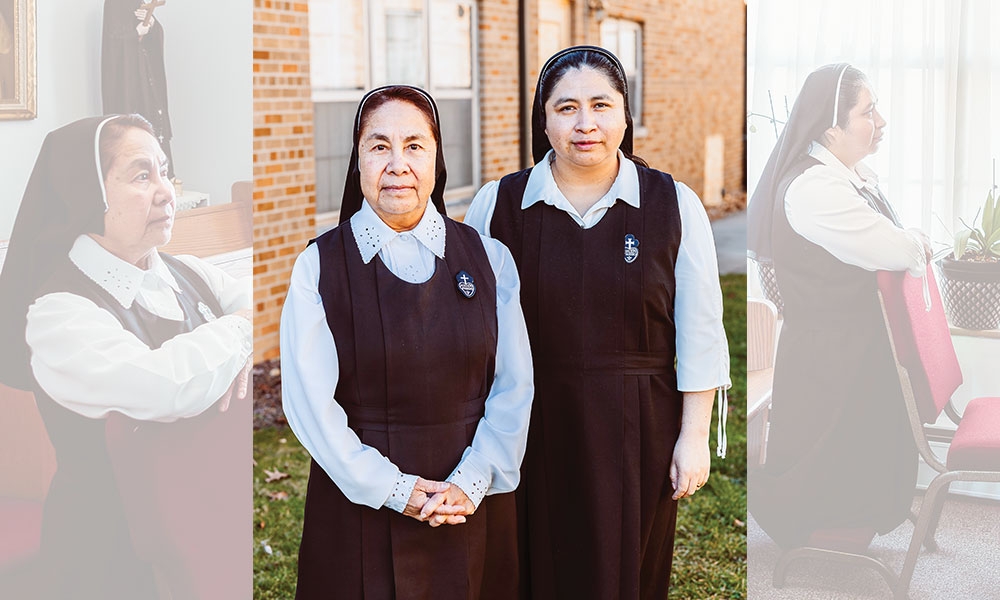
‘Remember … they are your brothers’
Throughout his papacy, Pope Francis has always insisted on a Church that goes beyond its walls and into the streets, reaching out to those most in need.
Sisters Maria Antonia Cruz and Dulce Maria Martinez endeavor to do just that.
Throughout his papacy, Pope Francis has always insisted on a Church that goes beyond its walls and into the streets, reaching out to those most in need.
Sisters Maria Antonia Cruz and Dulce Maria Martinez endeavor to do just that.
“We seek and find people who are lost, like a mother who searches for her children,” says Sister Maria Antonia. “We reunite them with the Church and teach them how to live as true children.”
Living in Jackson at St. Stanislaus Kostka Church since August 2023, the sisters both originate from Mexico and belong to the Congregation of the Passion of Jesus Christ. They are commonly called Passionists.
Founded more than 300 years ago in Rome by St. Paul of the Cross, Passionists are missionaries worldwide. Their aim? To search always for the most poor, the most in need.
And in the United States, those people are often Hispanic, explains Sister Maria Antonia.
According to the National Census Bureau, in 2021 there were 43,000 Hispanic Catholics living within the bounds of the Diocese of Lansing — a number that has been steadily increasing since 2010. These people represent 11.8% of the Catholics in our diocese.
In 2021, more than 16,000 of the Latinos in our diocese lived in poverty.
Almost 9,000 do not speak English well.
“Having these sisters in our diocese is a response to Pope Francis’ call to go out to the periphery, to go out to those who have been away from the Church for a while or who don’t know Christ,” explains Father Tim Nelson, pastor of St. Mary Star of the Sea and the Sagrado Corazon Hispanic community in Jackson. “Many of the migrants who come here are focused totally on work, so the sisters are trying to get them more involved in the parishes and get their kids in religious education and in the schools.”
Altogether, the sisters estimate they work with about 100 families in Adrian, 70 families in Jackson and 25 more in Hudson. And there are many more they have yet to meet.
What does this work look like practically?
A typical day begins with prayer, explains Sister Maria Dulce.
Leaving early in the day, before 8 a.m., the sisters attend Mass at the parish in Hudson, then visit a family in the area.
Then it’s off to the dairy farms.
“We go every week to visit the various dairy farms with Hispanic workers, Sister Maria Dulce says. “We talk with them and share the word of the Lord. In some places, we can only talk to them briefly because they have little time to stop their work.”
Yet despite their lack of time, the dairy farm workers are often eager to introduce the sisters to their family and friends. “Sometimes they provide an actual address to their homes, other times all they say is ‘just keep going straight, you’ll find them!’ It’s an adventure of searching,” Sister Maria Dulce says with a laugh. “And so we search, and we find, and little by little these people let us into their homes, and as trust is built, they begin sharing their experiences and needs.”
Visits to the homebound, reading the Gospels with those they encounter, extending a listening ear to those who have no one else, praying rosary novenas with families who have lost loved ones, and encouraging families to return to the sacraments — these are only some of the ways the sisters go out to the periphery.
At first, people are a little confused or maybe even opposed to the Gospel, the sisters share. But eventually, they begin to open up, their lives begin to change and they begin to understand not only with their minds but also with their hearts.
There have been three baptisms so far as a result of their ministry.
The work is slow, but the faith of the people they accompany is growing, poco a poco — little by little — the sisters explain.
“There are many people we have encountered who are Catholics by name but have been far, very far from the Lord,” says Sister Maria Antonia.
“But now, they continue the journey, slowly growing closer to Jesus. There has been an increase in faith. It doesn’t happen in only one day or one year; it is slow — the journey lasts a lifetime. The process is slow, but it is happening.”
Sister Maria Dulce has her own story to add.
“There are two men we visit on a dairy farm during their breaks. When we tried to read the Gospels to them, they had no idea what we were talking about. But now, little by little, they are beginning to understand and even apply the Gospel to their lives. They can discuss it with us and amongst themselves. This happens over a long period of time, but it is still real. These people must be accompanied because the journey is long, but it is real and necessary nonetheless.”
Both sisters admit that their ministry is a particular calling, and that often people open up simply because they are religious sisters. “We represent the presence of God,” they admit.
But even if the average “person in the pew” isn’t called to the daily life of visiting the homebound or the dairy farms, the sisters are emphatic that we all have a part to play in this missionary call. “To seek the lost is not craziness,” Sister Maria Antonia laughs.
“So what can you do? If you can do nothing else, simply smile! They are your brothers. Open the doors of your heart, and remember … they are your brothers.”
